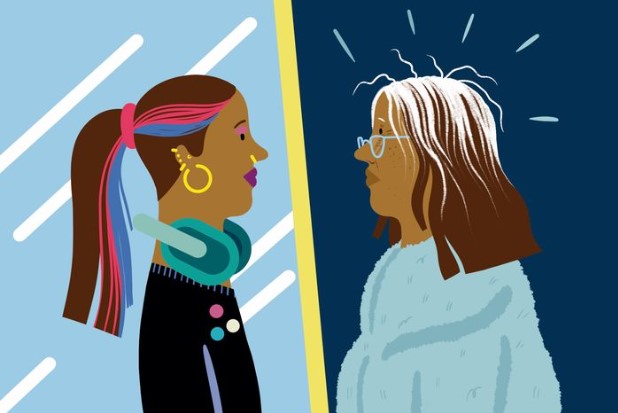May 06, 2023, 09:15
Oldest millennials reach decade when people often start to notice signs of aging.
 Millennials are starting to feel old.
Millennials are starting to feel old.
The first members of the millennial generation, often classified as those born between about 1980 and 1996, begin to turn 43 this year. It’s the average age when Americans stop feeling young, according to a study by Worldwide Independent Network of Market Research.
The early 40s—specifically 42—is when the average American starts noticing physical signs of aging, including achy joints and gray hair, according to a September poll conducted on behalf of Found, a weight-management company.
For some, the slide into 40 merely confirms a sense they’ve had for a while that they’re growing older. Others stay in denial about the approach of middle age until they experience a jolt of reality—sometimes a health scare, sometimes comments from younger colleagues.
“They aren’t feeling like the young ones anymore,” says Jean Twenge, 51, professor of psychology at San Diego State University and author of the recently released “Generations.”
The past three years have people of all ages feeling old or older. Stress, loneliness and disease accelerate the aging process, and there was plenty of that in the pandemic, say doctors and mental-health professionals. Not to mention fatigue from juggling hybrid work and school schedules.
When you first feel old
Context matters when it comes to feeling old, says Szu-chi Huang, who is among the first wave of millennials.
The 42-year-old associate marketing professor at Stanford Graduate School of Business says being around her older parents can make her feel young because she has more energy and is physically stronger compared with them. Being around college students, who dress differently and use unfamiliar slang, can leave her feeling old.
“I have trouble understanding what they mean,” she says.
She and a fellow researcher, Jen Park, a former Ph.D. student at Stanford and now an assistant professor at the University of British Columbia, recently completed a study of people between the ages of 18 and 60 and found that when people feel older they are more likely to donate and volunteer and “contribute more to the greater good of society.”
When exactly people start to feel old can vary widely.
Kent Fleming, 34, started feeling old after his 30th birthday when he realized that his body was changing and that he could no longer function on four hours of sleep or take off running without stretching.
The former college defensive tackle, who never went to see a doctor unless he needed a physical or had an injury, started going to one after having health problems and heart palpitations.
“The doctor told me I needed six hours of sleep a night and was stressed,” says Mr. Fleming.
The owner of Big Kent’s Strength and Fitness gym in Omaha, Neb., stopped eating fatty and spicy foods. He said many of his gym clients are about the same age and going through the same thing.
For Sarah Brody, 32, it’s less about feeling old as feeling different. The mother of a 21-month-old took ballet classes, did aerial acrobatics and went on last-minute weekend getaways when she was in her 20s.
Now, a weekend excursion is a 30-minute drive to the zoo with her daughter, Sophie. Ms. Brody hopes the things she did in her 20s aren’t forever behind her, but realizes they are out of reach right now.
“There’s some sense of loss that comes with it, a loss of things you used to do,” says Ms. Brody, who is the founder of a website and nonprofit corporation that helps new and expectant mothers connect, called Mamahood.
While Americans stop feeling young in their early 40s, they start feeling old at 52, on average, according to a survey by the Worldwide Independent Network of Market Research.
Embracing your age
Becca Levy, a Yale professor of epidemiology and psychology, says people can feel old at different times in their lives—even when they are younger.
“It’s a fluid concept,” she says.
Dr. Levy says she is starting to see a change in how people view getting older, by embracing their age and finding strengths in it. During the pandemic, more women skipped the hair dye and went gray. In her acceptance speech, Michelle Yeoh, who won her first Oscar at 60 for her performance in “Everything Everywhere All At Once,” told women not to “let anybody tell you you are ever past your prime.” And some people are working later in life and using their age to their advantage when applying for jobs.
The first time was when she was about 24, married and having trouble getting pregnant. Fast forward to her 80th year, when she was climbing a mountain in the Adirondacks with her grandchildren. She had climbed the same mountain dozens of times, but this time couldn’t make it to the top.
“It was a real comeuppance,” says Dr. Esty, a retired psychotherapist.
To get out of her funk, she decided to write a book, interviewing 128 octogenarians, many of whom were active, engaged and content. Dr. Esty retired at 86, now blogs and lives with her boyfriend of four years.
Back at Mr. Fleming’s gym in Omaha, the former football player believes it’s not the actual age that bothers millennials suddenly feeling old. It’s having to give up the illusion that they are young.
“I think people are extremely afraid, not so much of age but of the signs of age and not being able to do what they did,” says Mr. Fleming.
Community login






Add a comment